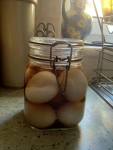
Bread - most people in this country would count it as a staple part of their diet. It makes sense, then, to eat a good quality loaf, with plenty of nutrients. Unfortunately, society has been brainwashed to some extent, by the masters of "convenience" and "luxury" - advertising executives have told us that bought, sliced bread represents the epitome of modern life - who would want to go back to the drudgery of the past, where baking bread was a regular part of daily life, and who wants to be up to their elbows in flour for hours making the bread? Well, those misconceptions have turned us into somewhat of a nation of cheap, sliced, white bread eating people - and that is not a good development.
The last time I was in Tesco, it was possible to buy "value" white, medium sliced bread for 30p a loaf. A more upscale branded white loaf was costing anything between 90p and £1.50 depending on the brand. How have we been brought to this?
The Chorleywood Bread Process was developed in 1961 by the Flour Milling and Baking Research Association, at a place called Chorleywood. UK grown wheat does not have a high protein content, and therefore did not make good bread - apparently, Canadian wheat was the most popular for good bread baking. However, the new process allowed UK wheat to be used, although it means that the nutrients in the bread are of reduced value. But this process also uses bread improvers and a special ingredient that we are totally unable to replicate at home - very high-energy mixing. It is this combination of reduced quality wheat, the addition of chemicals and the faster processing times which makes this bread inadequate. But it gets worse because this bread has added fat, which makes it spongy and light, but is really there to act as a preservative - "real" bread goes stale quite quickly. There is no need for fat in real bread.
"Give us this day our daily bread" - even the Lord's Prayer recognises the importance of fresh bread, made daily. Home-made bread is so much better in so many ways than Chorleywood bread, which makes up about 80% of the bread eaten in the UK today. We don't have to actually make it by hand these days, with the advent of the breadmaker, but there is a very therapeutic feeling about being responsible for the daily loaf. If it is made by hand, the baker has an even bigger input into the loaf, and probably more fun!
A fresh loaf, enough for the family to enjoy on a day to day basis, can easily be made in the breadmaker or by hand. When making bread by hand, I find it time-efficient to make several loaves and freeze the surplus for busy days.
1961 brought this mass-produced, quickly made bread to the shelves, and it co-incided with so many other things in the sixties - they were a time of change, and the bought, ready-sliced and wrapped loaf fitted in with those developments - more women in the workforce and not at home during the day, needing "fast" food to feed hungry families. It is no wonder that we as a nation easily fell into the trap of buying this stuff. I cannot remember my mother ever making a loaf of bread at all, although she was an excellent cook and made cakes and pastries as well as traditional meals every night. My father's family were bakers - three generations of them, and there is still a professional baker in my generation although he works for a big bakery nowadays. My grandfather had an old-fashioned bakery, rising early to bake that day's bread, and then (so he tells me) my father and his brothers helped to deliver the bread around the village on bicycles. Unfortunately that bakery business had to close down and although I don't know exactly when, I would have to say that it is probable that the rise of the Chorleywood loaf would have contributed to the closure of numerous such small bakeries in countless small villages.
I have one of my grandfather's very old cake tins which he would have used to bake round fruit cakes in, and whenever I use it, I think of him and the traditions that we are losing - we can stop that loss if we recognise it, and try to appreciate that not everything modern and new is necessarily a good thing! There is never a better time than right now to reclaim our history and our heritage and take control for ourselves of things which we have within our ability to change. Go and make a loaf of bread today and make a start on that change!
The last time I was in Tesco, it was possible to buy "value" white, medium sliced bread for 30p a loaf. A more upscale branded white loaf was costing anything between 90p and £1.50 depending on the brand. How have we been brought to this?
The Chorleywood Bread Process was developed in 1961 by the Flour Milling and Baking Research Association, at a place called Chorleywood. UK grown wheat does not have a high protein content, and therefore did not make good bread - apparently, Canadian wheat was the most popular for good bread baking. However, the new process allowed UK wheat to be used, although it means that the nutrients in the bread are of reduced value. But this process also uses bread improvers and a special ingredient that we are totally unable to replicate at home - very high-energy mixing. It is this combination of reduced quality wheat, the addition of chemicals and the faster processing times which makes this bread inadequate. But it gets worse because this bread has added fat, which makes it spongy and light, but is really there to act as a preservative - "real" bread goes stale quite quickly. There is no need for fat in real bread.
"Give us this day our daily bread" - even the Lord's Prayer recognises the importance of fresh bread, made daily. Home-made bread is so much better in so many ways than Chorleywood bread, which makes up about 80% of the bread eaten in the UK today. We don't have to actually make it by hand these days, with the advent of the breadmaker, but there is a very therapeutic feeling about being responsible for the daily loaf. If it is made by hand, the baker has an even bigger input into the loaf, and probably more fun!
A fresh loaf, enough for the family to enjoy on a day to day basis, can easily be made in the breadmaker or by hand. When making bread by hand, I find it time-efficient to make several loaves and freeze the surplus for busy days.
1961 brought this mass-produced, quickly made bread to the shelves, and it co-incided with so many other things in the sixties - they were a time of change, and the bought, ready-sliced and wrapped loaf fitted in with those developments - more women in the workforce and not at home during the day, needing "fast" food to feed hungry families. It is no wonder that we as a nation easily fell into the trap of buying this stuff. I cannot remember my mother ever making a loaf of bread at all, although she was an excellent cook and made cakes and pastries as well as traditional meals every night. My father's family were bakers - three generations of them, and there is still a professional baker in my generation although he works for a big bakery nowadays. My grandfather had an old-fashioned bakery, rising early to bake that day's bread, and then (so he tells me) my father and his brothers helped to deliver the bread around the village on bicycles. Unfortunately that bakery business had to close down and although I don't know exactly when, I would have to say that it is probable that the rise of the Chorleywood loaf would have contributed to the closure of numerous such small bakeries in countless small villages.
I have one of my grandfather's very old cake tins which he would have used to bake round fruit cakes in, and whenever I use it, I think of him and the traditions that we are losing - we can stop that loss if we recognise it, and try to appreciate that not everything modern and new is necessarily a good thing! There is never a better time than right now to reclaim our history and our heritage and take control for ourselves of things which we have within our ability to change. Go and make a loaf of bread today and make a start on that change!





































No comments:
Post a Comment